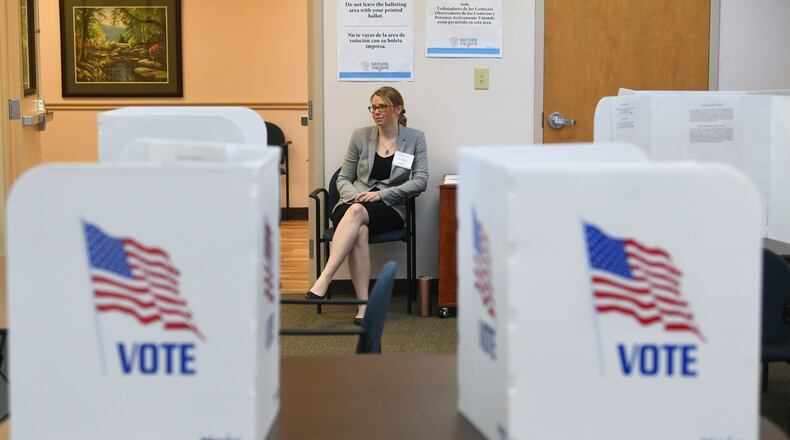A federal judge on Thursday dismissed a lawsuit that attempted to postpone Georgia’s June 9 primary election because of the coronavirus pandemic.
The ruling by U.S. District Judge Timothy Batten leaves the primary date unchanged, with in-person early voting set to begin Monday.
Batten wrote that elected Georgia officials have the authority to decide how to run elections — not the courts.
“The framers of the Constitution did not envision a primary role for the courts in managing elections, but instead reserved election management to the legislatures,” Batten wrote in a 12-page order after a hearing earlier in the day.
Lawyers for several Georgia voters had pleaded for a postponement of the primary, saying it would have allowed more time to vote by mail and prepare for in-person voting.
But attorneys for state election officials said everyone will be able to vote safely, and the primary must go on even during the coronavirus.
“Whether the executive branch has done enough is a classic political question involving policy choices. Thus, it is not properly before the court,” Batten wrote.
Secretary of State Brad Raffensperger sent absentee ballot applications to Georgia's 6.9 million active voters, encouraging them to avoid human contact at in-person polling places.
Precincts will be equipped with sanitizer and cleaning supplies. Elections officials are ordering styluses for voters to make their choices on touchscreens that will be frequently wiped down.
The lawsuit filed last month had asked the courts to postpone the primary for three weeks to June 30.
It also sought to replace voting computers with hand-marked paper ballots, institute curbside voting, provide more protective gear at precincts, and count absentee ballots as long as they're postmarked by election day.
“Voters have a constitutional right to vote in person in a reasonably safe environment, and they have a constitutional right to vote absentee and have those ballots counted,” Bruce Brown, an attorney for the plaintiffs, said during the hearing held in federal court in Atlanta and broadcast via Zoom. “There’s nothing radical about it.”
Josh Belinfante, an attorney for Raffensperger, said voters are ready and able to cast their ballots by mail or in person.
The presidential primary was already postponed twice, and the general primary was delayed once to the current June 9 election date.
Changing the election again would do more harm than good, he said.
“No one is not going to be able to vote, period,” Belinfante said. “Voters are not confused. Voters are not having the problems that are alleged.”
A significant part of the courtroom debate focused on whether problems with absentee voting will be resolved in time for the election.
Some voters, especially in Fulton County, haven’t yet received their absentee ballots after requesting them weeks ago.
But the secretary of state's office announced Thursday that more than 1.3 million absentee ballots — out of nearly 1.4 million requested — have now been mailed to voters. And over 278,000 voters have returned their completed absentee ballots to county election offices so far.
The lawsuit also requested a later election day because some voters might think it’s too late to participate since absentee ballots list the previous election date, May 19.
In addition, Brown said older voters might be disenfranchised because they should stay home under Gov. Brian Kemp's latest shelter-in-place order, which applies to people over 65 years old. Those voters might be reluctant to buy stamps or show up in person.
Batten asked whether a late June primary date could still present challenges if a “second wave” of the coronavirus hits.
“We don’t know what’s going to happen, but one thing that will happen if it’s moved is the state will be better prepared,” Brown said. “It’s dangerous now.”
The lawsuit was filed by five voters and the Coalition for Good Governance, an organization focused on election security and voting rights, which has argued in court for years for paper ballots filled out with a pen. The Coalition for Good Governance has said that Georgia's voting computers are an election security threat.
Lawyers for the secretary of state’s office responded that the group is trying to use the coronavirus crisis to achieve its paper ballot goal.
Raffensperger said election workers and voters are primed for the primary to take place June 9 as planned.
“The system is working, and voters are showing their confidence in it with their votes sent back by mail or deposited in drop boxes,” Raffensperger said. “Everything changed this year because of the COVID-19 pandemic, and these numbers (of absentee ballot requests) show those adjustments are successful.”
About the Author





